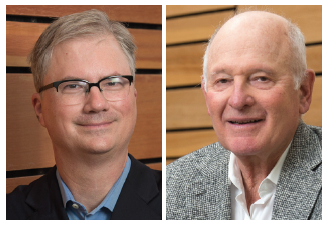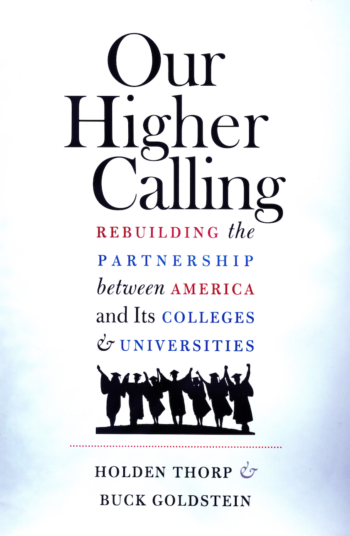
Faculty Book Talk Q&A: Provost Holden Thorp Discusses ‘Our Higher Calling’

In recent years, higher education in the United States has come under fire thanks to rising tuition costs and the growing belief that a college degree doesn’t guarantee a good job. In Our Higher Calling: Rebuilding the Partnership Between America and Its Colleges and Universities (UNC Press), Holden Thorp, provost of Washington University in St. Louis, and Buck Goldstein, entrepreneur in residence at UNC-Chapel Hill, provide a timely assessment of the state of higher education in light of such criticisms. Tapping into their own backgrounds as educators and talking with higher-ed leaders as well as figures from outside academia, they look at the obstacles faced by colleges and universities across the nation and consider strategies for moving forward.
Thorp and Goldstein will discuss Our Higher Calling on Tuesday, March 5, from 4:30-6:30 p.m. in Emerson Auditorium in Knight Hall. A reception and book signing will follow the talk. The event is free and open to the public.
Below, Thorp answers a few questions about the book.
College has long been viewed as a requisite next step for high-school graduates, but that attitude seems to be changing as detractors question the value of higher education. What are some of the factors that have led to this skeptical mindset?
The political polarization that is driving a lot of things in the American discourse produces a lot of the skepticism. A majority of Republicans do not believe higher education is improving America, and this is particularly true among young people without a college degree. This is a tragic situation, because the economic data are clear that college graduates are four times better off economically than those who didn’t go to college. Colleges and universities have ignored this trend for too long, and it is catching up with us. We need to do a better job of winning the public discourse instead of solely focusing on our campuses and what is going on there.
In the book, you state that the idea of partnership, “not only between universities and the government, but between universities and the public at large,” is central to the mission of higher education. How can institutions regain the trust of a doubtful public?
We offer four areas where colleges and universities can gain wide approval: academic medicine, local economic development, innovation and entrepreneurship, and career services. Some folks in our internal constituency cringe when they hear this list because it is solely focused on the usefulness of higher education instead of the psychic and social benefits. These folks have a reason to be skeptical, because administrators have been promising these things to the public ever since the Morrill Act of 1862, but administrators have not done a good job of explaining to the internal constituencies that this partnership comes with these promises.
On the other side, we have not said to the public that “I know you don’t understand why we need academic freedom, tenure, and shared governance, but we can’t give you the startup companies and cancer cures that you want without them.” This is a challenging conversation, and even more so because it’s decades too late after a lot of views have become solidified.

Declining enrollment numbers at colleges and universities, including a marked decrease in first-year student populations, is a trend you mention in the book. As an educator, do you find this discouraging? What’s the key to connecting with tomorrow’s students?
We’re very worried about declining enrollments. In 1945, Franklin Roosevelt and a visionary named Vannevar Bush set out to frame the partnership between higher education and the federal government that had as an important tenet the need to produce an educated citizenry after many young people had spent time fighting in World War II. This was a time when the federal government felt that higher education was crucial to the future of the country. In the last 70 years, we’ve allowed this to slip away.
To get more young people excited about higher education, we need to win the public argument, and we also need to take a long view about what a college degree means. At schools like WashU, we tend to think about elite, private higher education, but the schools that are really moving the needle for the country are urban publics in cities where the population is growing (schools like Temple, Georgia State, University of Central Florida), and the whole higher education system needs to be supportive of what these schools are doing. What these schools have shown is that financial support is critical, but so are numerous forms of social support, like what we are doing here with the Deneb STARS.
What do you hope readers will take away from the book?
That American higher education is crucial to the future of the country and that the debate about how to strengthen it and reverse the trend of declining public support is a critical step for the whole country. Part of what we hope people realize is that the system is extremely complicated, and it takes a lot of expertise to do this.
Many of our stakeholders don’t know all of the mechanics of financial aid, academic medicine, tenure, and shared governance. We try to walk folks through these things as painlessly as we can, but the conversation doesn’t work unless the parties are willing to do the work to understand all of this.
In 20 years, what do you think the landscape of higher ed will look like?
I think the top research universities like WashU will be relatively similar. But for the schools that depend explicitly on enrollment, the demographic changes in the U.S. will shape the future. In particular, we will continue to see growth among low-income students and people of color. That means that the urban publics will grow significantly while the geographically isolated, smaller schools will shrink or close. Just this week, we see Hampshire College edging towards winding down, and this is probably the most prominent school to go down that road. What that means for WashU is that we need to also respond to the demographic changes, as we have been doing but also be supportive of what is going on around the country and helping with the conversation about the future.
